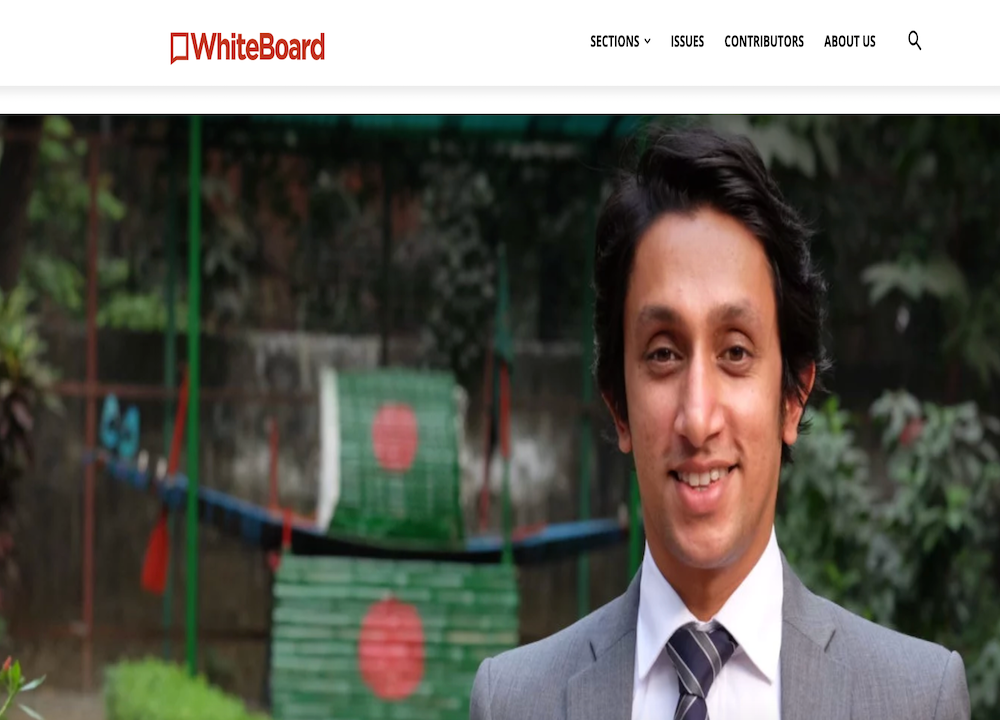
The Centre for Research and Information* is an organisation run by Radwan Mujib Siddiq Bobby, the nephew of the prime minister and whilst it presents itself as an independent think tank it acts as a soft propaganda wing for the Awami League. It has also become a conduit for smart ultra Awami League loyalists to make their way into the party and government power structures. So for example, Shah Ali Farhad, who was a senior analyst at CRI became special assistant to the prime minister immediately after the 2018 election.
In recent months, there have been some interesting developments in CRI.
It has become not just a ruling party think tank, but a ruling party family organisation. Bobby has been a trustee – probably Chair – for a long time. But this year Saima Wajed Putul – Bobby’s cousin and the daughter of the prime minister – has become its vice-chair . And just last month, his sister, Azmina Siddique has become a member of the Editorial Advisory Board of a new magazine set up by CRI , called Whiteboard . That is CRI has the involvement, of three members of the ruling party family.
As far as one knows, this is the first time that Azmina, who used to work for Tony Blair’s Institute for Global Change but now works at the Children’s Society, has formally put her toe into the waters of Bangladesh politics. Her sister Tulip, now a British Member of Parliament, was very much involved in the Awami League until around 2011, acting as the party’s spokesperson (though she has now scrubbed this all from her website). And whilst she denies any continuing connection with the Awami League, Tulip remained l inked to its UK wing until at least the last election when she gained its substantial support for her re-election last December. It will therefore be interesting to see whether her sister Azmina’s involvement in CRI is just a first step into Awami League politics.
The Awami League is always trying to bring into its orbit non-political but sympathetic civil society members, and the second interesting development is CRI’s new Whiteboard magazine – launched last month – seems to be another clever mechanism for doing just that. It has an Editorial Advisory Board which not only contains Azmina, but some unexpected individuals – with perhaps the most interesting being Asif Saleh, the son in law of Fazle Hasan Abed, the founder of BRAC, and its new Executive Director.
BRAC is the country’s – and indeed the world’s – foremost NGO, a particularly extraordinary achievement in the politicised environment of Bangladesh. One way in which BRAC has survived is by never getting involved in conflicts with the government, never being outspoken on controversial human rights issues, always working within the agenda of whichever party or entity is in power. While this has often upset human rights activists who would prefer BRAC to use its not inconsiderable influence on their behalf, BRAC knows that never getting involved in contentious matters has been an essential strategy to ensure its survival and growth.
On the other hand, however, BRAC has never got too close to any government – working with it in a constructive way, of course, but not allowing opposition parties and others to perceive it as partisan against them. So when there is a change in government, BRAC can continue to operate without unnecessary impediments.
So it is a surprise that Asif Saleh, without doubt a smart operator, has agreed to be a member of the Editorial Advisory board of a magazine produced by such a pro-government partisan outfit. Whilst Asif did not respond to Netra News request for comment, one of the editorial advisors sought to justify his involvement in the following way:
“Whiteboard is a policy magazine for young people and is not meant to be a partisan propaganda magazine. An important part of bringing systemic change is through influencing policy for the better. This is done by civil society through advocacy, activism and engagement with policy makers whichever party they may be from – not at the expense of its independence. Young people need to be part of this change and have the ability to take part in such discourse to understand policy implications for their future. Currently, he doesn’t see a lot of other platforms with that focus. The advisory role to Whiteboard, which is a non-paid role, is meant to be utilized in a way so that relevant policy issues are discussed in this platform where young people can engage, challenge and understand policy discourse. If his expectation is not reflected or his independence is compromised, he will not hesitate to move out of this role.” **
No doubt Asif took up this position with Whiteboard with the best of intentions, but whilst the person quoted says that the magazine is not “meant” to be a partisan propaganda magazine, it is certainly being produced by a partisan propaganda organisation – with the involvement of three members of the ruling party’s family. The subject of its first edition, Sheikh Mujib, should have been a clue to that.
Perhaps BRAC’s head is thinking that with no fair election in sight there is little risk in the foreseeable future for a change in government. And therefore on balance, getting close to the ruling family is a good bet for the organisation. And who anyway is really interested in who is on the Editorial Advisory Board of an inconsequential magazine like Whiteboard written in English? He may of course be right – however, at times of increasing autocracy, BRAC’s political independence requires nurturing not weakening.
The optics don’t look good.
// DB









